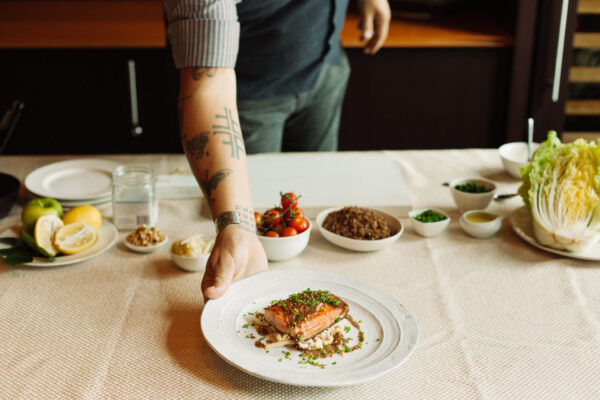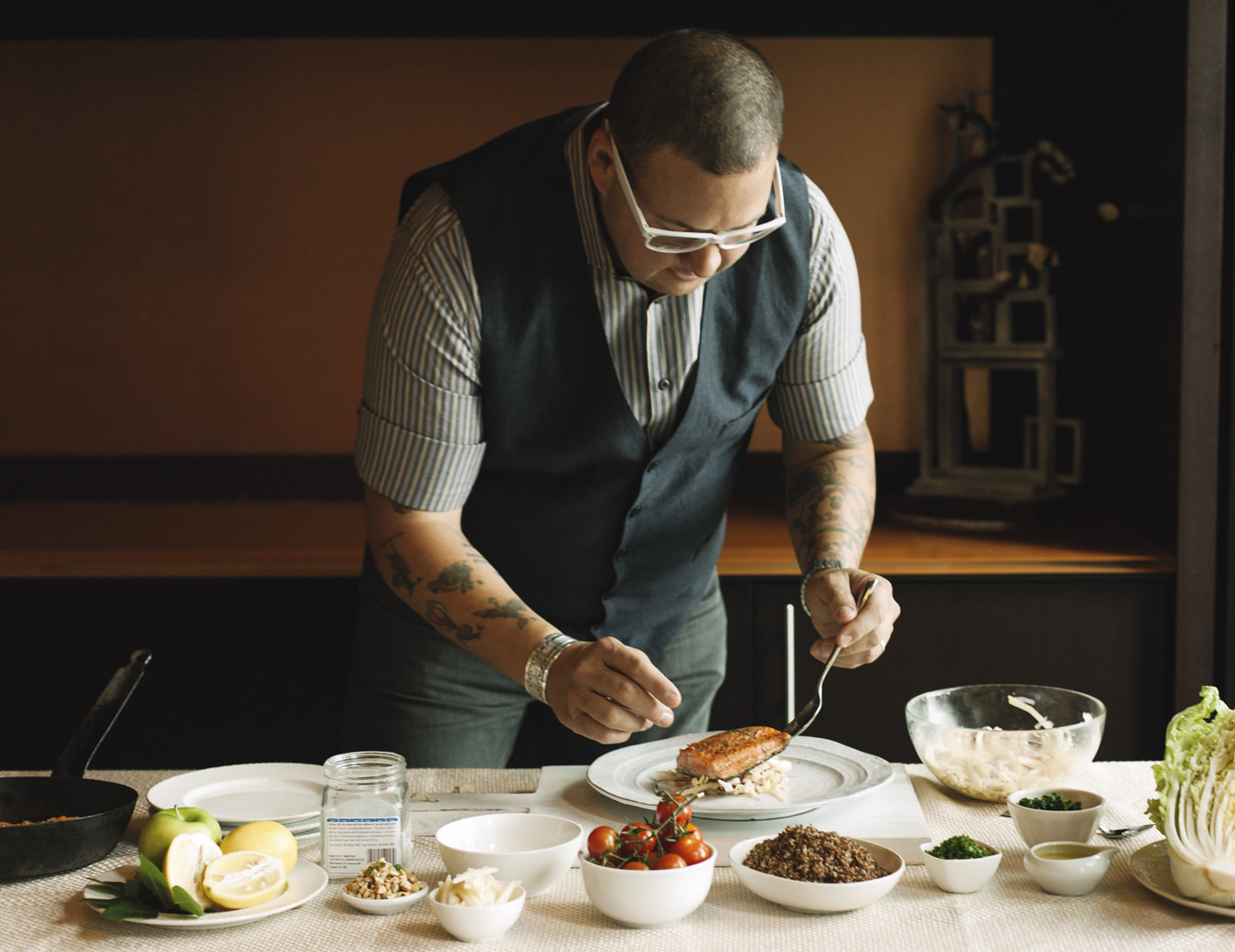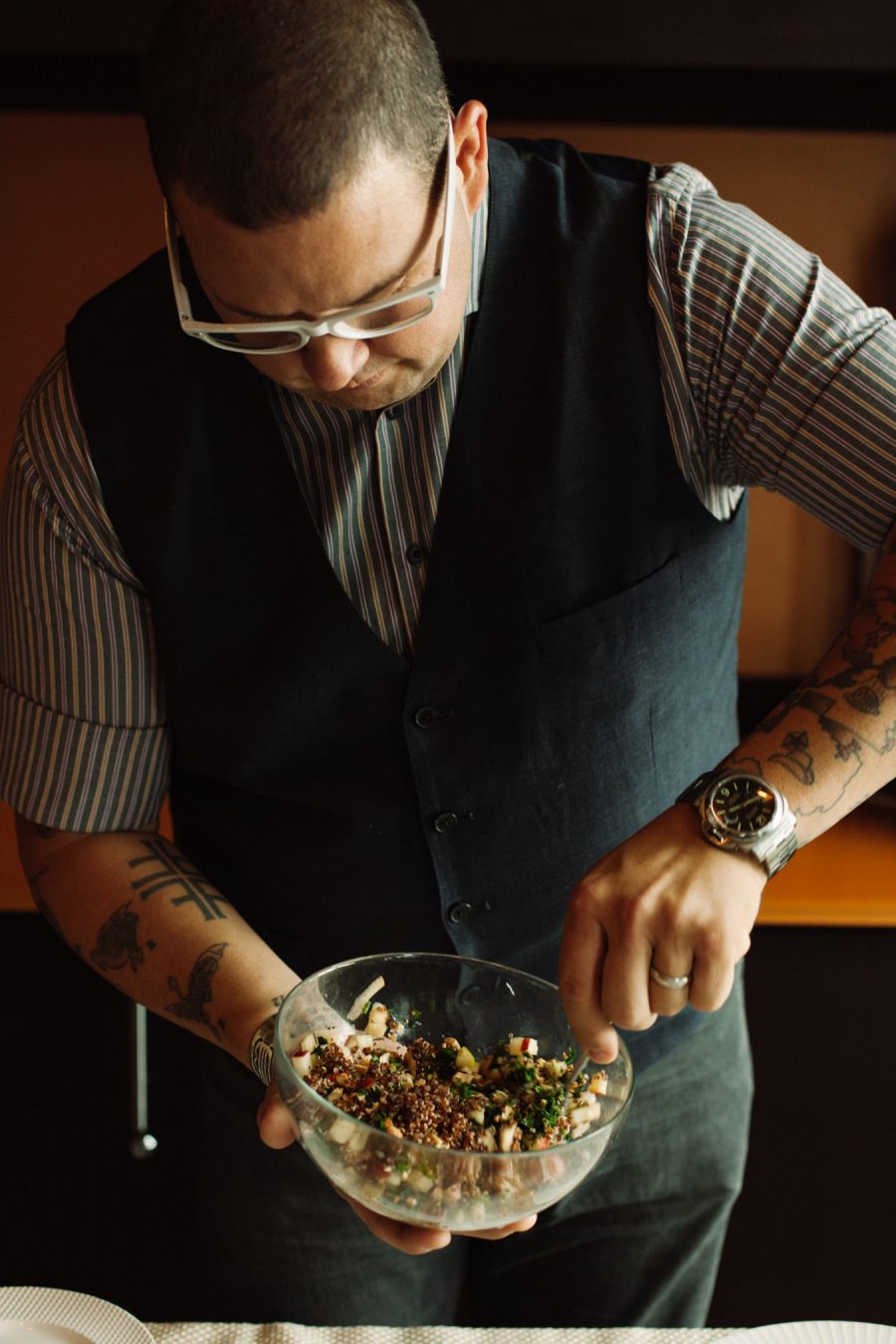Graham Elliot can’t wait to leave the room. It’s not that he’s bored in here, it’s just that he knows the Granville Island Public Market is down the street, and he is itching to go wander around and taste the tastes, smell the smells. Elliot is a two-Michelin-star chef, a former Masterchef judge, a three-time James Beard Foundation nominee—but he conducts himself with such warmth, such a lack of pretension, that at times his many accolades are easy to forget.
Upon hearing that great Chai tea can be found inside the market, Elliot whips out his phone—“I’ve got to show you this”—and pulls up a story on the history and origins of all kinds of tea. That’s just the Chicago chef’s personality: he is curious about everything, and loves understanding the physical and cultural roots of whatever he is consuming. When asked how he keeps himself honest in this business, he admits he may have the opposite problem. “Everyone has strengths and weaknesses, and one of my biggest strengths that I feel I have, as well as that I hear from everyone, is that I’m super genuine. So what you see is what you get,” he says. “I am honest to a fault.” Elliot explains that he does not have any signature dishes, and does not have to conform to a certain ethnic style of cooking like Japanese or French, which helps him remain honest not only with his words, but to his overall cooking doctrine. “I don’t have to do one style, and I always say, ‘If it’s not broken, break it,’” Elliot says. “So I’m always trying to reinvent things. I’m way more honest to that philosophy as opposed to having to uphold certain culinary values and historic recipes that my grandma handed off to me. None of that. It’s probably easier for me than for a lot of other people.”
His multi-layered honesty means Elliot is comfortable telling it like it is, unafraid to acknowledge when things are bad. And according to him, the current food climate is indeed pretty bad. He mentions “the hipsterization of food and the whole Instagram deal where it’s what it looks like, not what it tastes like,” and shakes his head at the idea of eating cold food just to ensure a dish was perfectly captured on camera. “People just want to say they were at that restaurant first, take pictures of it and post it, and never go back. It’s like this cool thing,” he says. “That kind of sucks for creative food, because now you have chefs from Vancouver to Omaha, Nebraska to Paris, all plating the same stuff. It all looks the exact same.” Ironically, as he talks, a hired food photographer and stylist with a huge Instagram following putters about the room and adjoining kitchen, prepping dishes from Elliot’s first cookbook, Cooking Like a Master Chef, that he will eventually plate for a photo shoot. The mise en place set-up does, admittedly, look good.
“I always say, ‘If it’s not broken, break it.’”
Despite the grave observation, Elliot is not completely without hope about the future of the industry, saying that “people know more about food than ever, which is great, because now you have a captive audience.” Still, it’s hard to get diners to come back to the same restaurant again and again when there are new ones opening all the time. “I’m guilty of it, too,” he confesses. “I want to check out as many places as possible.” But he avoids spots he sees as “predictable: they’ve got Edison bulbs hanging, exposed beams, and you go in, get the pork belly, the kale, and it’s just like, ‘I get it.’” It is almost as if decor and atmosphere matter more than the food itself, which unsettles the former Iron Chef America contestant. Still, he knows those trends are geared towards newer chefs, and understands “everyone goes on their little journey … I just hope that food continues to be tasty.”
The food, for him, is the bottom line. “The whole Michelin thing—they can take away stars tomorrow, they can give you 100 stars,” he says. “You become your own toughest critic, you do your thing. Maybe this year I want to do Italian because I went through Italy; maybe I want to unlearn everything and try new stuff. I try not to pay attention to that—all the TV, the awards—it doesn’t matter. It did a long time ago, it was all I was driven by. But not anymore.”

His personal mission is to inspire people to question everything, and points to two entranced Pacific Institute of the Culinary Arts students who hover inside the Bistro 101 kitchen, watching Elliot’s every move, soaking up every second they can in his presence. “Why do they wear a white chef’s coat in the kitchen?” he says. “I don’t know if they’ve ever sat back and asked that. It’s because 100 years ago in France, you were cooking with sugar, salt, cream, butter, flour: white things. No one does that anymore.”
One more interview awaits him, and then he can finally head to the market, finally do the food-related activities that he really loves: explore, learn, question, sample. It is easy to picture him weaving among the vendors, peering through his signature thick-rimmed glasses into display cases and asking where this fish came from or how the blueberry yield was this year. Maybe he even opts for a cup of the aforementioned Chai, but not before stopping to tell the girl behind the counter where it came from, and where it’s going.
Support Canadian publishing. Buy a copy of our Winter 2016 issue.












